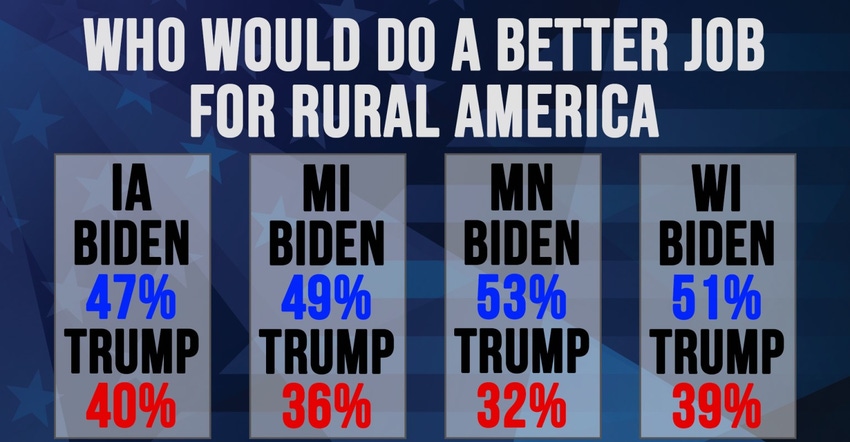
The presidential election is fewer than 90 days away, but the fight for rural American votes could prove crucial in whoever will be in the White House. Farmers have overwhelmingly supported President Donald Trump over the last four years, but it is voters in the Midwest swing states who will be important in Trump’s presidential run against Joe Biden this year.
A new poll released by Focus on Rural America found that if the election were held today, Biden would beat Trump 49 to 43 in Iowa, 51 to 41 in Michigan, 54 to 36 in Minnesota and 53 to 42 in Wisconsin. The poll was conducted by David Binder Research on July 30-31 among 800 likely November 2020 voters, with 200 in each state (Iowa, Minnesota, Wisconsin and Michigan).
Reiterating June focus group research, voters reported that Biden would do a better job for rural America than Trump. In each state, Biden beat Trump on rural leadership by seven points in Iowa, 13 in Michigan and Wisconsin and 21 in Minnesota. Trump did not lead Biden on a single rural value, lagging on everything from relatability to supporting farmers. In each state, more voters are convinced that Biden is better for farmers and rural America than Trump.
The survey also found that voters may be “souring on Trump”: More than half of the poll respondents in each state have an increasingly negative view of Trump today compared to 2016, and tracking with Wisconsin focus group research in June, voters believe Trump is putting his own interests and re-election before the needs of the American people.
Trump’s policies may explain his declining popularity in rural America. When asked how voters view renewable energy and biofuels, which are critical to rural economies and jobs, support was high: 83% in Iowa, 84% in Michigan, 82% in Minnesota and 81% in Wisconsin view renewable energy and biofuels favorably. Most respondents disapprove of Trump’s waivers for oil and gas, saying his handling of ethanol will negatively affect his re-election chances.
Biden’s Rural Plan calls for promoting ethanol and next-generation biofuels and investing $400 billion in clean energy research, innovation and deployment. “From day one, president Biden will use every tool at his disposal, including the federal fleet and the federal government’s purchasing power, to promote and advance renewable energy, ethanol and other biofuels,” the plan stated.
In an Aug. 6 roundtable on Biden’s farm policy, Senate Agriculture Committee ranking member Debbie Stabenow (D., Mich.) praised Biden’s efforts to increase biofuel use and bio-based manufacturing.
Also on the virtual roundtable discussion Stabenow hosted was Tim Boring, a sixth-generation Michigan cash crop farmer who farms wheat, barley, corn, soybeans and edible beans. He said trade policy has to be the number-one priority for the next president, and he supports Biden’s desire to pursue a “trade policy that works for American farmers.”
Biden’s rural policy states: “While Trump is pursuing a damaging and erratic trade war without any real strategy, president Biden will stand up to China by working with our allies to negotiate from the strongest possible position, and he’ll make sure our trade policy works for American farmers.”
Boring said he believes that Biden’s approach to international trade better sets up his farm for financial success. “We’ve damaged our relationships across the world,” he noted.
Stabenow said Trump’s trade policy has created chaos. “The chaos, loss of markets and loss of prices for farmers is devastating,” she said. “Biden understands we need consistency and relationships, and we do this together while creating jobs here and exporting our products, where agriculture exports are number one.”
Stabenow also supported Biden’s call for increasing investment in rewarding farmers for their role in reducing carbon emissions. His plan calls for partnering with farmers to make American agriculture first in the world to achieve net-zero emissions, giving farmers new sources of income in the process. This includes expanding the Conservation Stewardship Program and ensuring that farmers can participate in carbon markets. Stabenow proposed a bipartisan bill that aligns with many of these goals.
“We can be the leader in this,” Stabenow said of rewarding farmers for conservation actions they’re already taking and encouraging them to do more. “Farmers will lead the way.”
Jeff Link, co-founder of the Focus on Rural America campaign, said he thinks the Biden campaign has an opportunity to cut margins in the heartland, especially when including messaging about the rural economy.
“Our latest focus groups and this poll show that voters still give Trump credit for the economy and his business credentials, but that is it. They are sick of his tweeting and favoring corporate America. They think Joe Biden will listen to experts, support farmers and heal the nation,” Link said.
About the Author(s)
You May Also Like






